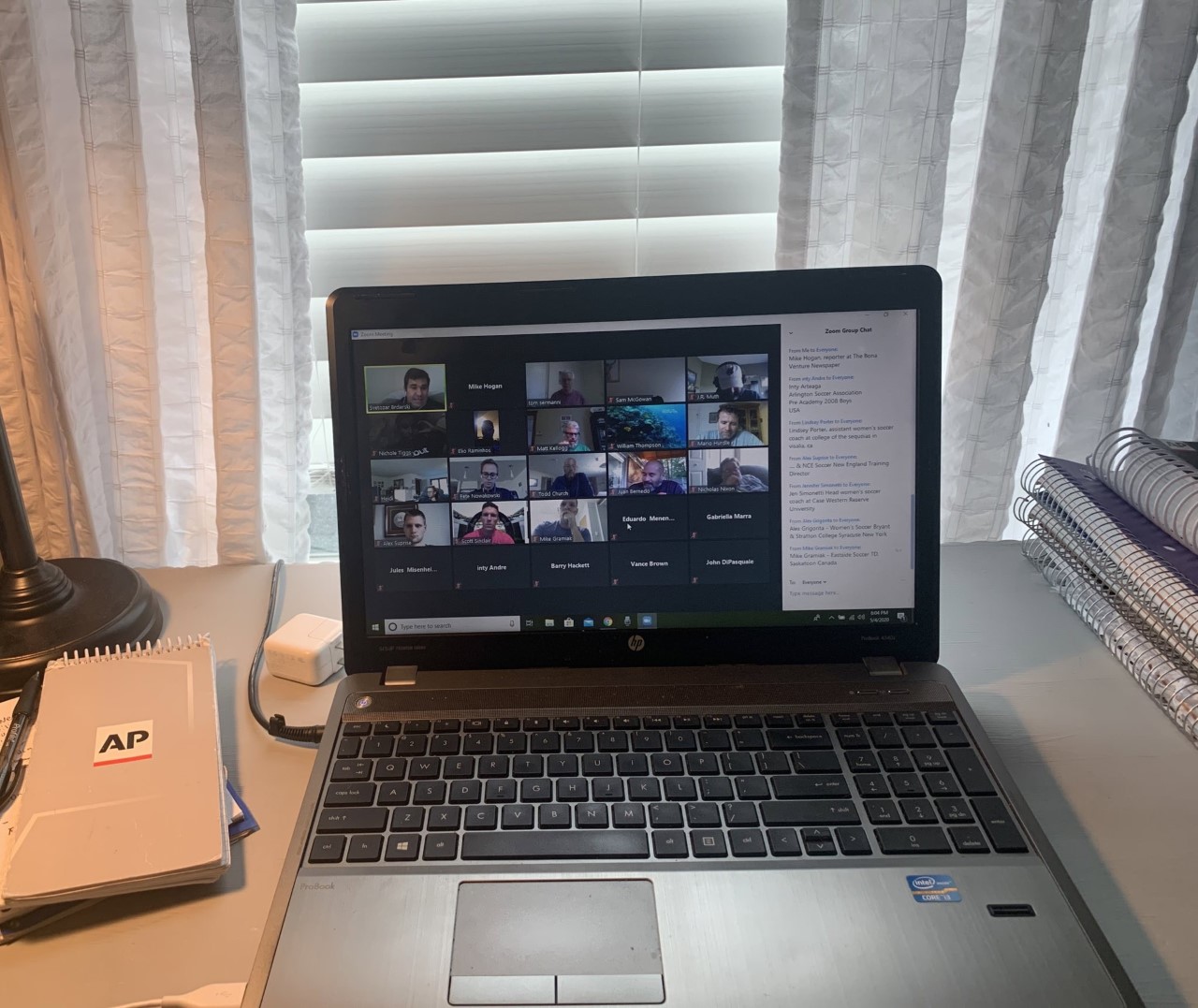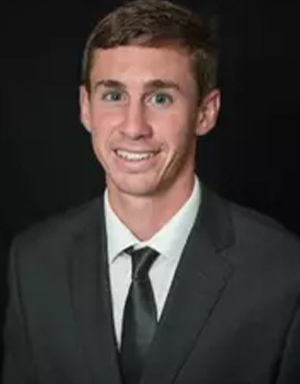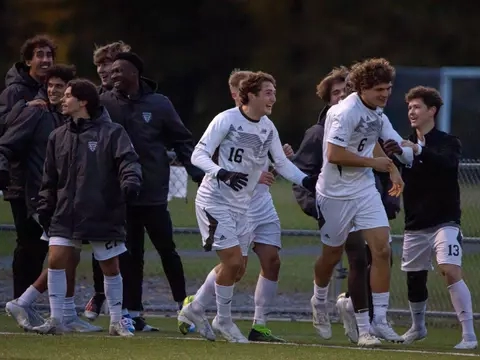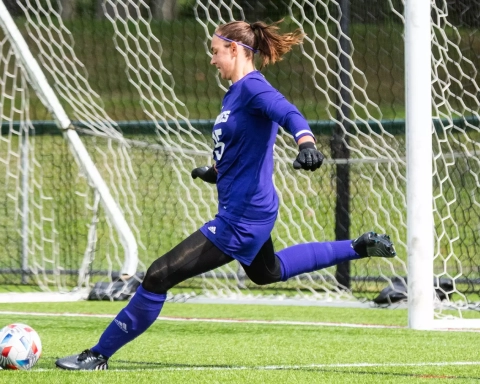By Mike Hogan, Associate Editor
Sometime in the future, St. Bonaventure women’s soccer coach Steve Brdarski will coach his players in person again. Games will be played at the Tom ‘80 and Michelle Marra Athletics Complex. The lights will be on. The hill filled with SBU students on a crisp fall night.
But when those moments happen, Brdarski doesn’t want them to be like the old normal he hears people clamoring for nowadays. He wants life on and off the pitch to be better. For himself, for his players, for everyone.
Brdarski admitted that it is easy to think about the missed opportunities he, his staff and his players missed out on this spring. Brdarksi hasn’t done that, though.
Instead, he’s done the opposite. He’s looking for solutions, and ways to get better.
“If you look for problems, there are plenty of them to see. If you look for solutions, there are plenty of them to see,” Brdarksi said. “It comes down to this: what do you want to find, and what do you want to see in the process?”
At this point of the spring, the women’s soccer team would have gone through workouts, practices and a handful of scrimmages.
But Brdarski said the spring season, for the most part, is about development. And that aspect hasn’t been lost.
“We have a new group,” Brdarski said. “We’re looking to develop leadership, to develop team cohesion. That’s what it’s about. Every player develops, gets better. Are we missing out on training sessions? Yeah. Are we missing practices? Yeah, we are. Are we missing the true goals and initiatives? No, we are not.”
Brdarski has held zoom calls with his players and staff. Not about soccer, but about life.
He feels as if his team will come away from this closer, and more connected than ever before.
“We’re in touch with our team all of the time. We’re working on these things. For the last two weeks, we’ve been working on the culture of our team and values we appreciate, and why we appreciate them. Essentially, we are working towards the fall season. We have phone calls with each player during the week. Are we talking to them about their workouts? No. We’re talking about life. About getting better as a person. What are we seeing from our team right now? We’re seeing them make changes. They’re adapting.”
Brdarski said, “Soccer for us is life. We’re showing them how to become better people. That’s how we look at it. I want to be on the field, but I am trading that for zoom calls. I am asking them about their family, and what kind of challenges they are facing now. We’re still committed to the values we have.”
Even for the average college student, transitioning from high school to college can be difficult. While his seven incoming freshmen can’t participate in team activities yet, Brdarski holds separate zoom meetings with them. In those meetings Brdarski relays the same messages to the incoming class.
“How can we help you?” Brdarski said. “What’s going on?”
One zoom session in particular stood out to Brdarski.
“We went through their challenges one day,” Brdarski said. “As a group, we came up with ways to help each of them. I thought it was incredible. Most people don’t like to expose what their situations are. There’s vulnerability that goes with that. But, before even knowing each other, here they are, talking with each other about their challenges. Rather than being down about it, they built each other up.”
Brdarski has also invested in himself over the past two months. From his home in Ohio, Brdarski started coaches4coaches, a coaching seminar for soccer coaches. Each week, a special guest joins a zoom call to talk about soccer, strategies and ways to improve. On May 4, former U.S. women’s national team coach Tom Sermanni joined the call.
“It’s been fun. We realize that we can make ourselves better coaches. We are all preparing ourselves to get back out there. It’s been really cool.”
Brdarski also sees improvement in his staff’s recruiting abilities. Having to do virtual recruiting has changed the game for Brdarski and his assistants Abby Pearson and Hannah Shay.
“We’re zooming with every one of them,” Brdarski said. “It’s one girl, maybe her parents and all three coaches. Up until now, that’s never happened. We’ve always had a coach that called the player, that was it. It was one-on-one time. I am telling you, we’re better recruiters now because of the last month and a half of work. It makes a difference. We’re able to connect with people even more. This is so much better. All three minds at once, totally dedicated to the athlete.”
Come fall, Brdarski expects his players to be back. He expects this year’s group to be hungrier than ever. But before the cleats can be laced up, Brdarski said he and his staff must create a plan to ensure player safety.
Moving too quickly with workouts and practices could have consequences.
“The players are going to want to do anything that they possibly can. As coaches, we need to figure out the right way to go about it,” Brdarski said. “Our girls will be in shape, they will be fit, but they haven’t gotten into a game. They haven’t gotten into a session where they are kicking a ball. They can’t replicate that right now. Because of that, we have to stagger the way we do training. The last thing we would want to happen is for players to get injured. That would be the worst. Our coaching staff has really been looking at how we can do things when we do come back. It’s forward thinking.”
And in regards to normalcy, Brdarski can’t stand to hear it. To the veteran head coach, if things go back to normal, this period didn’t serve its purpose.
“We want to be better. We want to take our circumstances, our experiences and the spirit of our group to be better. We want to figure out ways to develop mentally, physically and socially. We want to be better than we ever have. I don’t want to use that term of normalcy.”
hoganm17@bonaventure.edu






